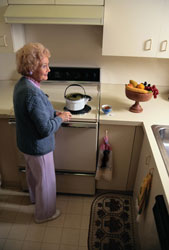Using science to aid the elderly
The EC-funded BETTER AGEING project investigated a variety of aspects leading to and surrounding frailty in the aged population. Efforts included research into actual muscle make-up and response as well as the effects of physical training regimes across European Union member states. The overall aim was to improve the quality of life of the elderly and limit the loss of independence attributed to motor difficulties. Project partner, University of Milan, concentrated on the levels of oxidative metabolism in ageing muscle. Specifically, researchers evaluated how the manifestations of ageing, at the cardiopulmonary and the skeletal muscle level, could or did affect oxidative metabolism in muscle cells. Results showed phenotypic changes in the ageing muscle as well as a significant decline of peak maximal aerobic power, when compared to young subjects. Elderly participants in the study took part in a one-year aerobic exercise to study the effects of exercise on muscle oxidative metabolism. Overall, researchers showed that ageing muscle is characterised by a significant limitation of oxidative metabolism. However, there was significant oxidative potential in the ageing muscle and the effects of training were indeed positive.







